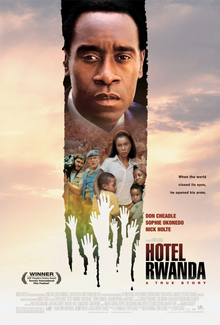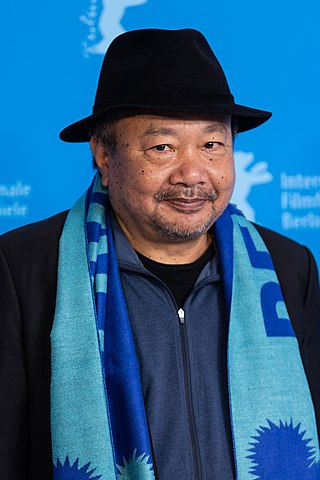Sweet Dreams may refer to:

Hotel Rwanda is a 2004 docudrama film co-written and directed by Terry George. It was adapted from a screenplay by George and Keir Pearson, and stars Don Cheadle and Sophie Okonedo as hotelier Paul Rusesabagina and his wife Tatiana. Based on the genocide against the Tutsi in Rwanda, which occurred during the spring of 1994, the film documents Rusesabagina's efforts to save the lives of his family and more than 1,000 other refugees by providing them with shelter in the besieged Hôtel des Mille Collines. Hotel Rwanda explores genocide, political corruption, and the repercussions of violence.

This is a bibliography for primary sources, books and articles on the personal and general accounts, and the accountabilities, of the 1994 Rwandan genocide.
God Sleeps in Rwanda is a 2005 documentary short subject about five women who were affected by the 1994 Genocide against the Tutsi in Rwanda. After the 1994 Genocide against Tutsi in Rwanda, most women both young, adults, and old were exceeding the number of men about 70% in which Ten of thousands of these women were raped and left at the battle to fight against the spread of HIV/AIDS, and therefore, this departed all women from the Rwandan society because their rights were not respected. Thus this documentary about God Sleeps in Rwanda has come to give us more insights about five Rwandan females who stood up for being the voice of other women.

Rithy Panh is a Cambodian documentary film director and screenwriter.

Shake Hands with the Devil: The Journey of Roméo Dallaire is a 2004 Canadian documentary film about the 1994 genocide in Rwanda. It was directed by Peter Raymont and inspired by the book Shake Hands with the Devil: The Failure of Humanity in Rwanda (2003), by now-retired Canadian Lieutenant-General Roméo Dallaire. It was co-produced by the Canadian Broadcasting Corporation, the Société Radio-Canada, White Pine Pictures, and DOC: The Documentary Channel.
Flower in the Gun Barrel is a 2008 documentary film focusing on the process of reconciliation and forgiveness in post-genocide Rwanda. The film depicts both the current conditions in Rwanda and the buildup to the genocide in 1994. It is unique in that it illustrates the complex challenges of average citizens attempting to forgive the neighbors who slaughtered their families. It is a testament to what human beings are capable of. The topic of forgiveness, and the difficulty of coming to terms with those who have killed one's parents, siblings, children and neighbors, is a universal theme that comes to life through the example of Rwanda.
Anne Aghion is a French-American documentary filmmaker. She is a Guggenheim Fellow, a Mac Dowell Colony Fellow and a Rockefeller Foundation Bellagio Center Fellow.

In Rwanda We Say…The Family That Does Not Speak Dies is a documentary film examining the Gacaca justice process in the aftermath of the Rwandan genocide against the Tutsi in 1994. Directed by Anne Aghion and produced by Gacaca Productions, this 2004 film won an Emmy Award for "Outstanding Informational Programming." Filmed in Rwanda, the language of In Rwanda is Kinyarwanda with English subtitles.

Gacaca, Living Together Again In Rwanda? is the first documentary film in a trilogy by Anne Aghion examining the aftermath of the Rwandan genocide. Directed by Anne Aghion and produced by Dominant 7, Gacaca Productions, and Planète, this 2002 film won UNESCO's Fellini Prize. Filmed in Rwanda, the language of Gacaca is Kinyarwanda with English subtitles. In Kinyarwanda, gacaca means "grass", which was the location of the reparation trials in Rwanda.

My Neighbor, My Killer is a 2009 French-American documentary film directed by Anne Aghion that focuses on the process of the Gacaca courts, a citizen-based justice system that was put into place in Rwanda after the 1994 genocide. Filmed over ten years, it makes us reflect on how people can live together after such a traumatic experience. Through the story and the words of the inhabitants of a small rural community, we see survivors and killers learn how to coexist.
The Notebooks of Memory is the third documentary film in a trilogy by Anne Aghion examining the aftermath of the Rwandan genocide.
Anne Karoline Frogner is a Norwegian filmmaker, photographer, writer and lecturer. She is one of Norway's foremost documentary filmmakers and is a stills photographer for the image agency Samfoto. She is the director of production company Integritet Film AS and the author of several books.
Lisa Fruchtman is an American film and television editor, and documentary director with about 25 film credits. Fruchtman won the Academy Award for Best Film Editing for The Right Stuff (1983). With her brother, Rob Fruchtman, she produced, directed, and edited the 2012 documentary Sweet Dreams.
During the Rwandan genocide of 1994, over the course of 100 days, up to half a million women and children were raped, sexually mutilated, or murdered. The International Criminal Tribunal for Rwanda (ICTR) handed down the first conviction for the use of rape as a weapon of war during the civil conflict, and, because the intent of the mass violence against Rwandan women and children was to destroy, in whole or in part, a particular ethnic group, it was the first time that mass rape during wartime was found to be an act of genocidal rape.
Rising From Ashes is a 2012 independent documentary film about the development of a national cycling team in Rwanda, a country still affected by 1994 Rwandan genocide where an estimated 500,000–1,000,000 Rwandans were killed.

Nadia Ben Rachid is a Franco-Tunisian film editor. She has over thirty years of experience, and has spent two decades working with filmmaker Abderrahmane Sissako. She won the award for Best Editing at the 2015 Césars for Sissako's 2014 film Timbuktu.
Keepers of Memory is a 2004 documentary directed by Eric Kabera. It documents the eyewitness accounts and traumatic aftermath of the 1994 Rwandan genocide.
Iseta: Behind the Roadblock is a documentary based on the Rwandan genocide released in 2008. It is the only film that contains documented segments of footage of actual killing during the Rwandan genocide.








